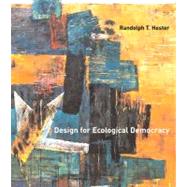Design for Ecological Democracy
, by Hester, Randolph T.- ISBN: 9780262515009 | 0262515008
- Cover: Paperback
- Copyright: 9/24/2010
Winner, 2007 Davidoff Award presented by the Association of Collegiate Schools of Planning (ACSP), Winner, Scholarly Illustrated Category, 2007 AAUP Book Jacket and Journal Show. and Winner of the Architecture & Urban Planning category in the 2006 Professional/Scholarly Publishing Annual Awards Competition presented by the Association of American Publishers, Inc. Over the last fifty years, the process of community building has been lost in the process of city building. City and suburban design divides us from others in our communities, destroys natural habitats, and fails to provide a joyful context for our lives. In Design for Ecological Democracy, Randolph Hester proposes a remedy for our urban anomie. He outlines new principles for urban design that will allow us to forge connections with our fellow citizens and our natural environment. He demonstrates these principles with abundantly illustrated examples-drawn from forty years of design and planning practice-showing how we can design cities that are ecologically resilient, that enhance community, and that give us pleasure. Hester argues that it is only by combining the powerful forces of ecology and democracy that the needed revolution in design will take place. Democracy bestows freedom; ecology creates responsible freedom by explaining our interconnectedness with all creatures. Hester's new design principles are founded on three fundamental issues that integrate democracy and ecology: enabling form, resilient form, and impelling form. Urban design must enable us to be communities rather than zoning-segregated enclaves and to function as informed democracies. A simple bench at a centrally located post office, for example, provides an opportunity for connection and shared experience. Cities must be ecologically resilient rather than ecologically imperiled, adaptable to the surrounding ecology rather than dependent on technological fixes. Resilient form turns increased urban density, for example, into an advantage. And cities should impel us by joy rather than compel us by fear; good cities enrich us rather than limit us. Design for Ecological Democracyis essential reading for designers, planners, environmentalists, community activists, and anyone else who wants to improve a local community.






